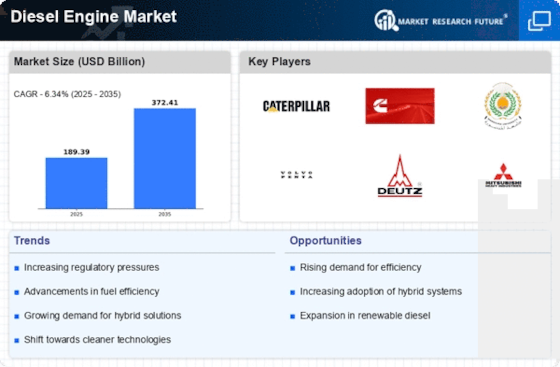Top Industry Leaders in the Diesel Engines Market

*Disclaimer: List of key companies in no particular order
Top listed global companies in the Diesel Engines industry are:
AGCO Corporation
China First Automobile Works (FAW) Group Corporation
Robert Bosch GmbH
Deere & Company
Continental AG
Delphi Automotive System Private Limited
Mitsubishi Heavy Industries, Ltd.
Ford Motor Company
General Motors Company
MAN SE
Wärtsilä Oyj Abp
Cummins, Inc.
Caterpillar
Rolls-Royce Motor Cars Limited
Bridging the Gap by Exploring the Competitive Landscape of the Diesel Engines Top Players
The diesel engine market, while facing headwinds from environmental concerns and alternative fuel advancements, remains a significant force in powering various industries. Understanding the competitive landscape becomes crucial for both established players and new entrants. This analysis delves into key player strategies, market share factors, emerging trends, and the overall competitive scenario.
Key Players and Strategies:
Global Giants: Caterpillar, Cummins, Volvo, and MAN Diesel & Turbo dominate the market with established distribution networks, diverse product portfolios, and strong brand recognition. Their strategies revolve around continuous innovation in fuel efficiency and emission reduction technologies, along with strategic acquisitions and partnerships to expand reach and market share.
Regional Players: Weichai Power and FAW Jiefang in China, Doosan Infracore in South Korea, and Mahindra & Mahindra in India are formidable regional players leveraging cost advantages and catering to specific regional needs. Their strategies focus on cost-effective engine development, customization, and building strong local dealer networks.
Niche Players: Smaller players like Yanmar and Kubota excel in specific segments like agricultural and construction engines. Their strategies involve specialization, technological differentiation, and building strong relationships with OEMs in their respective sectors.
Market Share Analysis:
Product Type: Engine power output, speed, and application (e.g., on-road, off-road, stationary) significantly influence market share. Heavy-duty engines for trucks and construction equipment hold a large share, followed by smaller engines for agricultural and marine applications.
Geographic Distribution: Emerging economies like China and India drive market growth due to rising infrastructure investments and industrial activity. Developed markets like Europe and North America, while experiencing slower growth, still hold significant shares due to established infrastructure and higher adoption of emission control technologies.
Customer Segments: The market caters to diverse segments like transportation, construction, agriculture, power generation, and marine industries. Each segment has unique needs and preferences, influencing player strategies and market share distribution.
New and Emerging Trends:
Clean Diesel Technologies: Advancements in fuel injection systems, emission control technologies like SCR and EGR, and alternative fuels like biodiesel are driving the development of cleaner diesel engines. Players are investing heavily in these technologies to comply with stricter emission regulations and cater to growing environmental concerns.
Electrification and Hybrid Solutions: The rise of electric vehicles and hybrid powertrains is posing challenges to the diesel engine market. However, players are exploring hybrid engine solutions and electric powertrains for specific applications, aiming to maintain their market presence.
Digitalization and Connectivity: Integration of sensors, data analytics, and remote monitoring capabilities is transforming engine operations and maintenance. Players are leveraging these technologies to offer enhanced engine performance, optimized fuel efficiency, and predictive maintenance services, creating a competitive edge.
Overall Competitive Scenario:
The diesel engine market remains fiercely competitive, with established players facing challenges from regional competitors and new entrants. While environmental concerns and alternative fuel advancements pose long-term threats, the immediate focus is on developing cleaner technologies, exploring new market segments, and adapting to digitalization trends. Players who can effectively navigate these challenges and demonstrate adaptability will be best positioned to maintain or expand their market share in the years to come.
The competitive landscape of the diesel engine market is dynamic and evolving. Understanding the key players, their strategies, market share factors, and emerging trends is crucial for navigating this complex landscape. By embracing innovation, adapting to changing market dynamics, and focusing on environmental sustainability, players can secure their position in this vital industry.
Latest Company Updates:
Robert Bosch GmbH:
- Ongoing focus on developing low-emission diesel engine technologies: collaborating with major manufacturers on various projects, including next-generation common-rail injection systems and exhaust aftertreatment technologies. (Source: Bosch website, Press releases)
Deere & Company:
- Recent investments in electrification and alternative fuels: developing hybrid and electric agricultural equipment, while also exploring biofuels and renewable diesel options. However, diesel engines remain a core technology for their machinery. (Source: Deere & Company website, Investor Relations)
Continental AG:
- Active in both diesel and electrified powertrain technologies: supplying components for both types of engines and focusing on fuel efficiency and emissions reduction. (Source: Continental AG website, Powertrain & Drivetrain)
Delphi Automotive System Private Limited:
- Primarily focused on electric vehicle components: limited information available on recent diesel engine developments. (Source: Delphi Automotive website, Products & Services)










